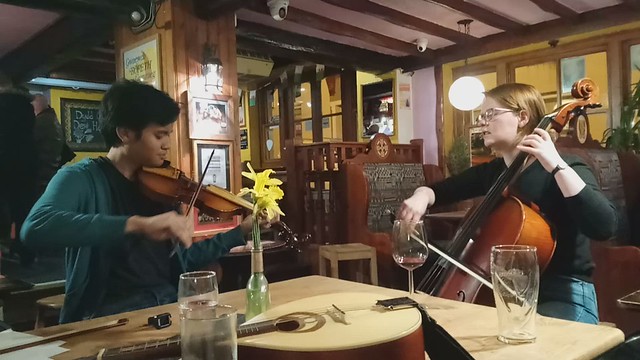Imagine you’re with a group of people who all share a common language, and some of the group may also speak another language. Is it rude for them to speak that language, knowing that some members of the group won’t understand them, and might feel excluded?
Let’s say the common language is English, and some of the group speak Spanish. If you were a monoglot English speaker, you might feel excluded / annoyed if some members of the group speak Spanish, a language you don’t understand.
Imagine if you worked in an office where everyone speaks Mandarin and English, but you only speak English. Would you tell them to speak exclusively in English all the time, or at least when you’re around?
If you were the boss, you might do so. This was in fact the situation where I worked in Taipei – the boss only spoke English, so we all spoke English with him, while we spoke a mixture of Mandarin, English and Taiwanese among ourselves.
How about if everybody in the group but you speaks a language like Catalan, Basque, Welsh or Irish, would you expect them all to switch to a more-widely spoken language, such as Spanish or English, so you can understand and/or feel included?
There have been cases of monoglot English-speaking managers in businesses in Wales and Ireland insisting that their staff speak to each other in English rather than Welsh or Irish. The managers want to understand what their staff are saying, and don’t want any non-Welsh or Irish-speaking customers to feel excluded.
At the Welsh music session I go to, we speak mainly Welsh and bits of English. For the native speakers of Welsh, it’s normal to speak their mother tongue, and for the fluent learners like me, it’s a great opportunity to practise the language. Some of the people who come to the session don’t speak Welsh, or are just starting to learn it. However, they don’t complain that they can’t understand, and don’t insist that we speak English.
When I hear someone speaking in a language I don’t know, my ears prick up and I try to guess what language it is and what they’re talking about. Sometimes I might even ask them what language they’re speaking. Other people might not react in this way, and may even feel intimidated / irritated if everyone around is speaking in foreign.

Other than political propaganda, what makes you think that Catalan is an endangered language?
The UNESCO Atlas of the World’s Languages in Danger lists five such languages in Spain: Aragonese, Asturian-Leonese, Basque, Gascon and Guanche (which is extinct).
I know that Catalan is not an endangered language, but it is a minority language in Spain, isn’t it? I have re-written that paragraph now.
It is not a minority language in Catalonia, no. It is used in official matters, television, radio, arts, day to day. It is the native language of a lot of catalonians, and it is taught in the school.
In Catalonia (with 7,5M habs.), 84,7% of population are able to speak it, 97,4% understand it, 90,5% read it and 62,3% write it (data from 2003-2004, it’s likely higher today).
Of course, almost 100% also speak, write and read Spanish. Catalonia is almost fully bilingual.
The situation regarding Galician, for example, is direr. Not because of political regulations, it’s just that the percentage of native users is much lower (though still much, much better than Irish, for example).
Regarding your question: “How about if everybody in the group but you speaks a language like Catalan, Basque, Welsh or Irish, would you expect them all to switch to a more-widely spoken language, such as Spanish or English, so you can understand and/or feel included?”
Many Spaniards feel rude to be in a group of people speaking Catalan among them, but what they don’t realize is that, for bilingual people, switching to the other language is almost unconscious. Specifically, if person A has always used Catalan to speak to B, they will tend to switch to Catalan when speaking to B even if there’s a non Catalan-speaking C present. They can do the effort to use Spanish, and they will certainly do so with C, but as soon as A turns to say something to B, or B to A, they will almost invariably switch to Catalan. It’s like our brains associate specific people with specific languages, and it does require an special effort to keep the switch from happening.
I speak competent Spanish (Castilian) as a foreign language- but have a problem in that my Catalan is basic. Always feel bad speaking Spanish in Catalonia- and, good for them, a few Catalan people show slight annoyance when I use Spanish; a few will only reply in Catalan. I think that’s great and most of the time I can understand the Catalan. I would also echo other comments in saying that away from Barcelona, Catalan is more dominant than Castilian and in no way feels endangered. (Now retired, I live in Catalonia for a few months each year so am not really just a tourist but neither a resident either).